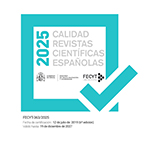Un análisis de la hegemonía cultural masculina en la alta dirección en la Universidad del Reino Unido
Resumen
Este artículo examina cómo la universidad en el Reino Unido es creada y perpetuada por los hombres para los hombres. Se basa en tres de los proyectos de investigación de la autora cuyos hallazgos indican patrones de discriminación en los institutos de Educación Superior (ES) del Reino Unido. Los proyectos de investigación recogieron datos cualitativos y cuantitativos. La investigación cualitativa se basó en entrevistas semi-estructuradas en profundidad a 80 académicos, mujeres y hombres en todos los niveles de la jerarquía académica del Reino Unido. La investigación cuantitativa se llevó a cabo a través de una encuesta on-line a diferentes perfiles de alta dirección en los institutos de Educación Superior (ES). Se explora la hipótesis de que un importante mecanismo para la continuidad de una dirección de la ES, dominada por hombres, es la disyunción entre los procesos formales e informales en torno a la promoción universitaria. Por un lado, mientras que los procesos formales transparentes buscan localizar las políticas de promoción dentro de la legislación sobre Igualdad de Oportunidades (IO), otros procesos informales importantes son opacos, si no invisibles, p.e., definiciones de mérito y formas de fomentar el desarrollo profesional. Estos últimos se basan más bien en formas particulares de autopromoción, promoción por parte de otras personas influyentes, e interpretación subjetiva de las políticas de una manera que tiende a marginar a las mujeres. Se argumenta que la hegemonía cultural masculina, al replicarse, perpetúa estructuras y prácticas que son insulares y diseñadas para beneficiar principalmente a un reducido grupo de hombres en la alta dirección. Estas tendencias tienden a ser predominantes, fundamentalmente en aquellas disciplinas en las ciencias físicas o ingeniería en las que predominan los hombres. Se argumenta que las mujeres deben cuestionar estas estructuras y procesos para hacer que las universidades sean más compatibles con las aspiraciones de las mujeres en el mundo académico y para hacerlas más exitosas institucionalmente.Descargas
Descarga artículo
Licencia
La revista Investigaciones Feministas, para fomentar el intercambio global del conocimiento, facilita el acceso sin restricciones a sus contenidos desde el momento de su publicación en la presente edición electrónica, y por eso es una revista de acceso abierto. Los originales publicados en esta revista son propiedad de la Universidad Complutense de Madrid y es obligatorio citar su procedencia en cualquier reproducción total o parcial. Todos los contenidos se distribuyen bajo una licencia de uso y distribución Creative Commons Reconocimiento 4.0 (CC BY 4.0). Esta circunstancia ha de hacerse constar expresamente de esta forma cuando sea necesario. Puede consultar la versión informativa y el texto legal de la licencia.











